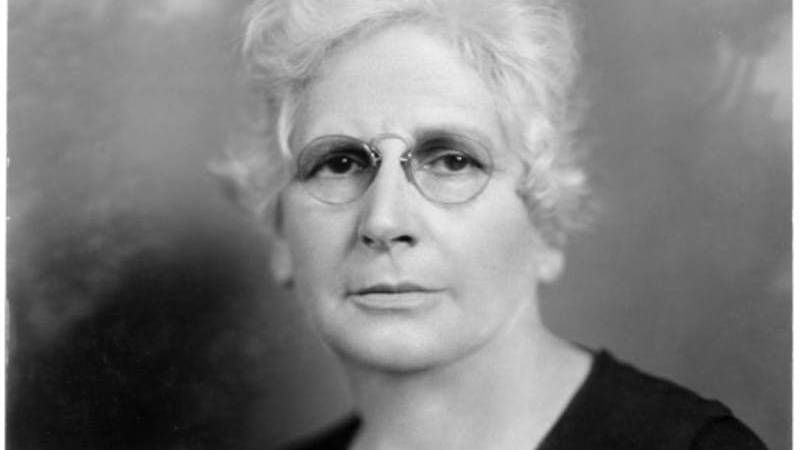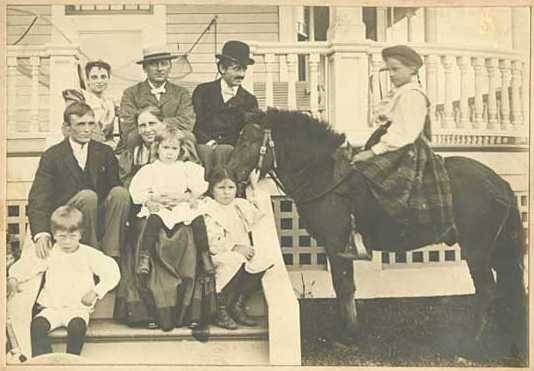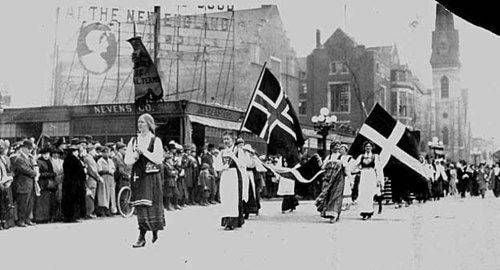Before There Was Amy, Before There Was Ilhan, There Was Clara
Clara Ueland quite literally led the path for Amy Klobuchar and Ilhan Omar to have voices, much less successful political careers.

In January 2019, when Ilhan Omar was sworn into Congress, she was the first Somali-American, the first naturalized citizen from Africa and the first woman of color from Minnesota to be elected. Many Minnesotans know and often boast of this fact.
A month later, Amy Klobuchar took the stage at Boom Island Park during a blizzard to announce her candidacy for president. Attending a political rally in a snowstorm really does sum up the experience of living in the Twin Cities.
Minnesotans are proud to be from the same state as influential female political leaders. But how much do they know about the first women that championed the cause for women’s political power in their home state?
About 105 years before Ilhan was sworn in and Amy announced her run, Clara Ueland marched down the same neighborhood streets, leading a parade for women to win the vote.
Clara Ueland was born in Akron, Ohio, and moved to Minneapolis when she was 12. She married a prominent Norwegian lawyer, Andreas Uelend, and they raised their eight children on the south shore of Lake Calhoun. She taught her sons the importance of housework and encouraged her daughters to go to college.
Ueland worked as a schoolteacher, teaching seventh and eighth grades. Through her career, she campaigned for women to serve on the Minneapolis School Board. She helped to establish several free kindergartens throughout the Twin Cities.

Ueland began attending women’s organization meetings and was fundamental in helping establish the Women’s Club of Minneapolis, which still stands today, overlooking Loring Park. In 1901, she attended a Minneapolis Suffrage Convention, where she focused her efforts on helping women to gain the right to vote.
Ueland rose through the ranks of organizations, eventually becoming the first president of the Minnesota League of Women Voters after women gained the right to vote. She was notoriously outspoken and was known for declaring, “Minnesota denies the vote to criminals, lunatics, idiots and women. Is this chivalry?” In 1913, she founded the Equal Suffrage Organization of Minneapolis, which was known for its male as well as female members.
A year later, Ueland’s efforts materialized in what would be the largest suffrage parade Minnesota had ever seen with over 2,000 attendees. Prior to the parade, many people didn’t take suffragists seriously, dismissing them as hopeless spinsters, unhappily married women and people who had nothing else to do. Many came to the parade to cheer, while others came to jeer. Hecklers placed bets that the parade wouldn’t start on time, and had to pay up when Ueland and the suffragettes began their parade at 4 pm sharp.

The Minneapolis Morning Tribune on May 3, 1914 described the parade as “a revelation and a bump for those who have formed their ideas of suffrage.” The parade put the face of suffrage unapologetically on the public stage. Onlookers were astounded to see women and men of all ages, backgrounds and professions in the demonstration, giving them a completely different perspective of the face of the movement.
Ueland was able to see the passing of the 19th Amendment in 1919, granting all American women the right to vote when it was ratified by Tennessee in 1920. Even after her retirement, Ueland worked closely with the League of Women Voters. Ueland remained a determined activist campaigning for child labor laws at the Capitol the day before she died in 1927. Tragically, she was struck by a truck near her home and died from injuries.
Most Minnesotans are proud to be from a politically active hotspot. Protests outside of the Governor’s Mansion on Summit Avenue or marches up to the steps of the Capitol are not uncommon. Minnesotans are not afraid to exercise their civic duties and freedom to assemble, and this heritage of activism owes much to Clara Ueland. Clara threw a parade so that Amy and Ilhan’s voices could be heard today.
Watch the Minnesota Experience documentary, Citizen, which explores the multigenerational march of Minnesota women and all they hoped would come with the vote.
Editor’s note: This story – and others in the collection, Then & Now: Reflections on Women’s Suffrage – was written by a St. Catherine University student in the Public Relations Writing class held in the spring of 2020. The piece has been minimally edited to preserve the integrity of the student’s perspective. We hope you enjoy discovering what the next generation of writers, historians and activists has to say about the impact of the women’s suffrage movement then and now.

This story is made possible by the Arts and Cultural Heritage Fund and the citizens of Minnesota.
As Minnesotans look for ways to show their support for healthcare workers on the front lines of the COVID-19 pandemic, we took a look back in time to celebrate the contributions that four women – all named Ruth – made to the state’s public health system.
Just 39 words in length, the 19th Amendment to the U.S. Constitution gave women the right to vote when it was passed on June 4, 1919 and enacted on August 26, 1920 – but its passage was fraught with decades of legal challenges and intense demonstrations in which women activists sometimes put their lives directly on the knife’s edge. Explore a timeline contributions of Minnesota women to the passage of the 19th Amendment.
